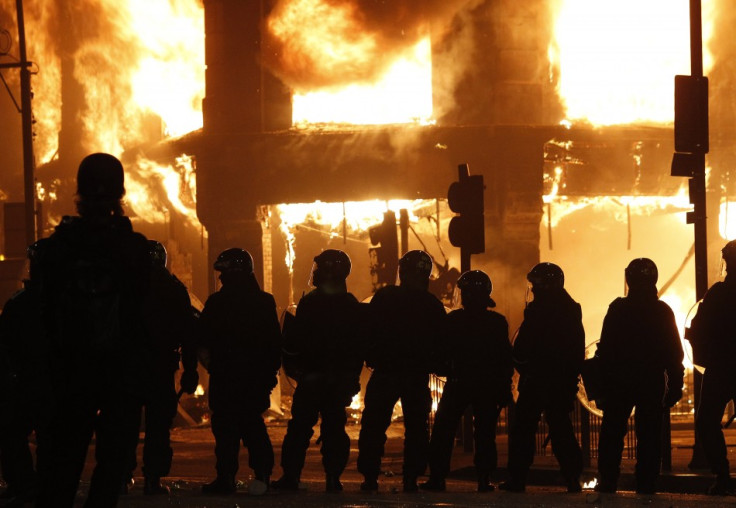English Riots: Report Cites Aggressive Police Tactics

A joint study by The Guardian and the London School of Economics has identified anger at police as a central cause of the August riots in England.
For the project, "Reading the Riots," researchers interviewed 270 rioters from major cities across England where unrest broke out in August, including London and Manchester, to see why people took part in one of the country's worst outbreaks of violence and looting.
The rioting was initially triggered by the killing of black 30-year-old Mark Duggan by armed police officers in Tottenham, London.
The Independent Police Complaints Commissionis currently investigating what led to Duggan's death. Police say he was armed.
In the study, 85 percent of respondents cited policing as "important" in what caused them to riot, saying they are angry at the treatment they receive at the hands of the police.
Inevitably, the question surrounding the riots becomes: How can policing change to quell the anger?
John Graham, director of the Police Foundation think tank, said there is too much focus on what the police can do in terms of the powers they have, rather than looking at how they police.
The riots reflected a "continuous underlying tension" between some parts of society and the forces that police them, according to Graham.
Some communities feel the "police are not on their side", he said, adding that there are issues concerning the perceived "legitimacy" of policing in certain areas and among certain groups of people.
He stressed accountability as a significant factor in improving policing because "at a local level there's a democratic deficit".
Next year, the government is introducing local elected police and crime commissioners to respond to people's concerns and needs.
"I think next year will provide an interesting experiment," Graham said optimistically.
"Let's see where it takes us ... rather than pre-judge it."
Graham also highlighted the "apparent inconsistency" in government policy on accountability regarding one of the most controversial areas of policing - stop and search powers.
While the government has said it wants to see more police accountability, it also removed the legal requirement for police officers to record stopping people on the street.
Police routinely use stop and search powers, particularly in London and against black youths, which is known to create tensions between communities and law enforcers.
Youths feel unfairly singled out and that their rights are being abused when stopped by police officers.
Under Section 60 of the 1994 Criminal Justice and Public Order Act, police were given powers to stop and search people without reasonable suspicion of wrongdoing.
Research by the LSE and the Open Society Justice Initiative in 2010 found that black people are 26 times more likely than whites to be stopped under these powers.
A 2007 report by the Home Affairs Committee, "Young Black People and the Criminal Justice System," found that black youths make up 8.5 per cent of the prison population, yet only 2.7 per cent of the population as a whole.
"I think that The Guardian's report confirms what many people suspected," said Kam Gill, a research and policy analyst at the Runnymede Trust, a leading race and equality think tank.
"The fact that that the riots erupted following the shooting of a young man in a community that historically has had extremely tense relations, for instance, seems key but also seemed to drop out of popular discourse, having been outweighed by discussion of' 'pure criminality' and 'shopping with violence'."
Gill has also worked on StopWatch, a campaign against draconian police stop and search powers.
"Young people that we talk to in StopWatch often cite police behaviour, and stop and search in particular, as a course of deep resentment and antipathy dating back generations.
"It is therefore, perhaps, not surprising that generations of these impacted communities cite the police as a causal factor in these violent and destructive outbursts."
Like Graham, Gill sees closer ties and police accountability within communities as a solution.
"These problems are complex and will require a multiplicity of responses, but one must surely be to focus less on 'total policing' and aggressive tactics and instead to focus on building good relations with communities, based on the understanding that good effective police work can only take place with the cooperation and consent of those policed," he said.
The Association of Chief Police Officers, responding to the Guardian/LSE study, focused on the heavy police numbers used to crush the rioting, rather than any need to improve relations with some sections of society.
"The disorder seen in August was unprecedented in its scale of violence and the way in which events escalated rapidly," said a spokesperson for ACPO.
"It took people by surprise. Not enough police officers were available initially and it eventually required 16,000 of them to restore order.
"Of course, the way in which those events took place and were seen by others through the media had an impact on confidence in the police and it is important that lessons are learned from all the different processes and reports investigating what happened.
"In a survey of 270 rioters, it would be quite odd if a high proportion did not cite the police as a factor in their behaviour. But August also showed the ability of our police to restore order using robust, common sense policing in the British way."
© Copyright IBTimes 2025. All rights reserved.






















